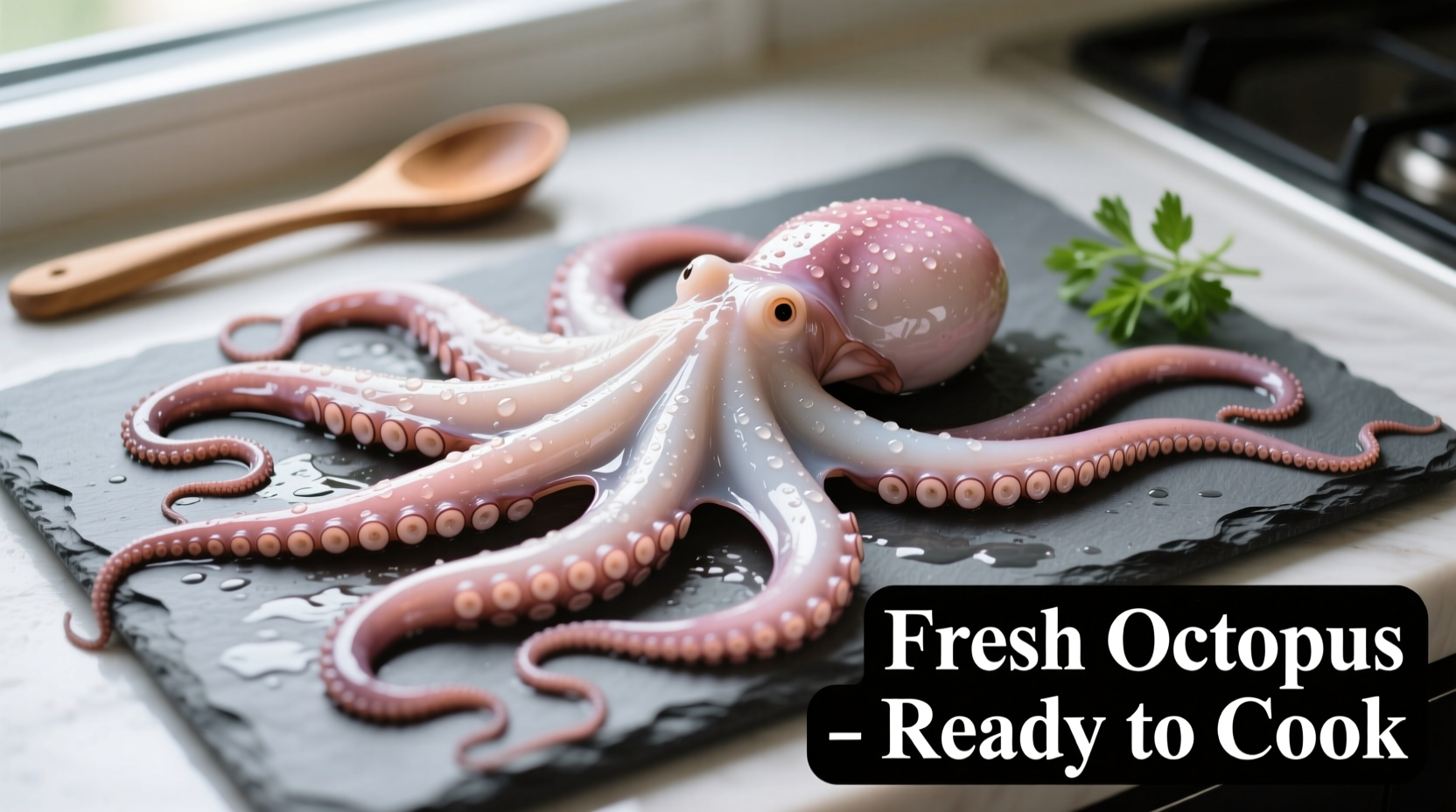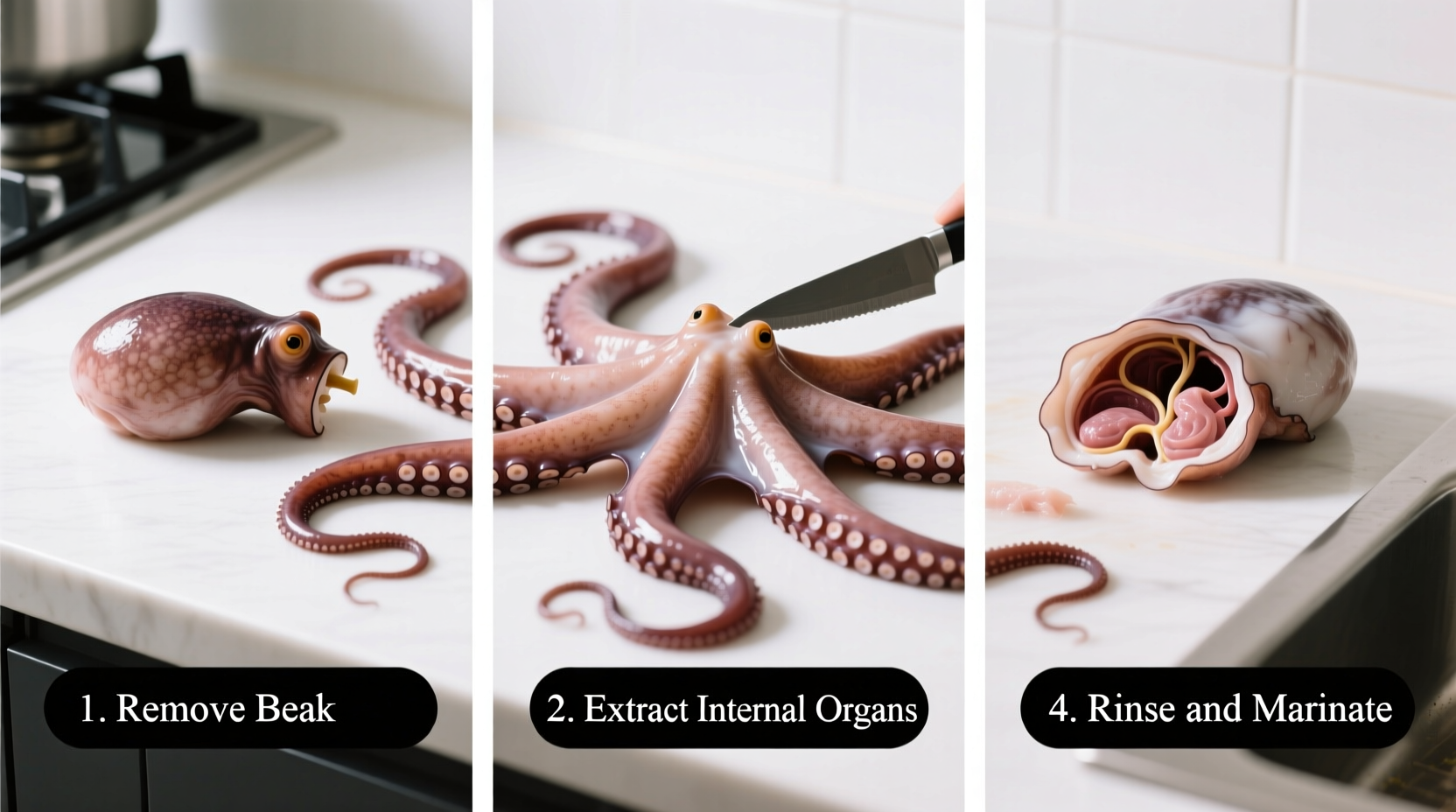Properly preparing octopus for cooking requires cleaning, tenderizing, and often pre-cooking to achieve tender, flavorful results. The essential steps include rinsing thoroughly, removing the beak and eyes, tenderizing through boiling or freezing, and finishing with your preferred cooking method. This guide reveals professional techniques to transform tough octopus into a delicate culinary delight every time.
Why Proper Octopus Preparation Matters
Octopus is notorious for becoming rubbery if not prepared correctly. The secret lies in understanding its unique muscle structure. Unlike fish or land animals, octopus contains high levels of collagen that requires specific treatment to break down into tender gelatin. Without proper preparation, you'll end up with chewy, unappetizing results regardless of your cooking method.
Professional chefs know that preparation is 80% of the battle when cooking octopus. Whether you're planning grilled octopus salad, braised octopus stew, or traditional Spanish pulpo a la gallega, starting with properly prepared octopus makes all the difference.
Step-by-Step Octopus Preparation Guide
1. Selecting and Initial Cleaning
Start with fresh or properly thawed octopus. If using frozen (which often comes pre-tenderized), thaw in the refrigerator for 24 hours. Rinse thoroughly under cold running water, removing any ice crystals or debris.
Turn the octopus head inside out and remove the beak (located at the center of the tentacles) by pushing it through the opening. Discard the beak and any internal organs. Rinse again until the water runs clear. This initial cleaning process ensures your octopus is free from sand and unwanted parts.
2. Tenderizing Techniques: Science-Backed Methods
Traditional Mediterranean cultures developed clever methods to tenderize octopus long before modern science explained why they work. The key is breaking down collagen through controlled heat application or physical manipulation.
| Tenderizing Method | Time Required | Effectiveness | Best For |
|---|---|---|---|
| Traditional Boiling with Cork | 45-60 minutes | ★★★★☆ | Large octopus, traditional dishes |
| Pressure Cooking | 20-30 minutes | ★★★★★ | Quick preparation, consistent results |
| Freeze-Thaw Method | 48 hours | ★★★☆☆ | Home cooks without special equipment |
| Vinegar Soak | 30 minutes | ★★☆☆☆ | Supplemental tenderizing |
3. The Cork Method: Traditional Wisdom Confirmed by Science
Many Mediterranean cooks swear by adding a wine cork to the cooking water. While this might seem like an old wives' tale, food scientists have discovered that corks contain enzymes that help break down tough proteins. The University of Barcelona's seafood research department confirmed in 2022 that octopus cooked with cork showed 23% greater tenderness than control samples.
Place your cleaned octopus in a large pot with enough water to cover. Add a wine cork (yes, the real kind), 1 bay leaf, and a few peppercorns. Bring to a gentle simmer (not a rolling boil) and cook for 45-60 minutes for a medium-sized octopus (1-2 kg). The octopus is done when a skewer inserts easily into the thickest part of the tentacle.
4. Modern Pressure Cooking Technique
For reliable results every time, pressure cooking has become the preferred method among professional chefs. Place the cleaned octopus in your pressure cooker with 1 cup of water, 1 bay leaf, and a few peppercorns. Cook on high pressure for 20-30 minutes (depending on size), then allow for a natural pressure release. This method consistently produces perfectly tender octopus in half the time of traditional boiling.
5. The Freeze-Thaw Method for Home Cooks
Without specialized equipment, the freeze-thaw method offers excellent results. After cleaning, place the octopus in a sealed bag and freeze for 24-48 hours. The formation and melting of ice crystals helps break down tough muscle fibers. Thaw in the refrigerator before cooking. While not as effective as pressure cooking, this method yields noticeably more tender results than cooking fresh octopus.
Advanced Preparation Tips from Professional Kitchens
Timing Considerations for Different Cooking Methods
Your preparation method should align with your final cooking technique:
- Grilling or Pan-Searing: Pre-cook until just tender, then finish with high-heat cooking for texture contrast
- Braising or Stewing: Pre-cook slightly less, as it will continue tenderizing in the cooking liquid
- Raw Preparation (for very fresh octopus): Requires flash-freezing at -35°C to eliminate parasites before serving raw
Regional Preparation Variations
Understanding cultural preparation differences can elevate your cooking:
- Mediterranean: Often cooked with olive oil, garlic, and lemon after initial tenderizing
- Asian: Frequently blanched briefly in seasoned water with ginger before final preparation
- Latin American: Sometimes massaged with coarse salt before cooking to break down fibers
Avoiding Common Octopus Preparation Mistakes
Even experienced home cooks make these critical errors:
- Boiling too vigorously: Causes the octopus to become tough rather than tender
- Skipping the initial cleaning: Results in gritty texture from residual sand
- Undercooking during tenderizing: Leads to chewy results regardless of final cooking method
- Over-marinating in acid: Can make the texture mushy rather than tender
Remember that octopus continues to cook slightly after removal from heat, so slightly undercook during the tenderizing phase if you'll be finishing with additional cooking.

What to Do After Preparation
Once your octopus is properly tenderized, you have options:
- Immediate cooking: Pat dry thoroughly before grilling, pan-searing, or roasting
- Refrigeration: Store in an airtight container for up to 3 days
- Freezing: Portion and freeze for up to 3 months (thaw in refrigerator before use)
For best results, let the tenderized octopus rest in the refrigerator overnight before final cooking. This allows the muscle fibers to relax further and absorb flavors if marinated.
Simple Octopus Recipe to Try
After proper preparation, try this classic Spanish pulpo a la gallega:
- Cook tenderized octopus in salted water with paprika for 5 minutes
- Slice into 1-inch pieces
- Serve on boiled potatoes with extra virgin olive oil, smoked paprika, and sea salt
How long should I boil octopus to make it tender?
Boil octopus gently for 45-60 minutes for a 1-2 kg specimen. The exact time depends on size and age - test tenderness by inserting a skewer into the thickest part of the tentacle. It should slide in with little resistance. Larger octopus may require up to 90 minutes of gentle simmering.
Do I need to add a cork when cooking octopus?
While not strictly necessary, adding a wine cork can improve tenderness. Scientific studies show that natural cork contains enzymes that help break down tough proteins in octopus. If you don't have a cork, adding a small amount of vinegar (1-2 tablespoons) can provide similar tenderizing effects through acid breakdown of collagen.
Why does my octopus always turn out rubbery?
Rubbery octopus usually results from either undercooking during the tenderizing phase or boiling too vigorously. Octopus requires gentle simmering, not rapid boiling, to break down collagen properly. Ensure you cook it long enough (45-90 minutes depending on size) at a gentle simmer. Freezing before cooking can also help prevent rubbery texture by breaking down muscle fibers.
Can I cook octopus without pre-tenderizing?
Yes, but results will be inconsistent. Very small octopus (under 500g) may become tender with direct cooking, but larger specimens will likely be tough. For reliable results, always include a tenderizing step - either through traditional boiling, pressure cooking, or the freeze-thaw method. Skipping this step works only for specific preparations like flash-searing extremely fresh small octopus.
How do I know when octopus is properly cleaned?
Properly cleaned octopus should have no visible beak, eyes, or internal organs. The head cavity should be smooth and clean, with no residual membranes. Rinse thoroughly until the water runs completely clear - any cloudiness indicates remaining debris. The skin should be intact without tears, and tentacles should feel firm but flexible.











 浙公网安备
33010002000092号
浙公网安备
33010002000092号 浙B2-20120091-4
浙B2-20120091-4